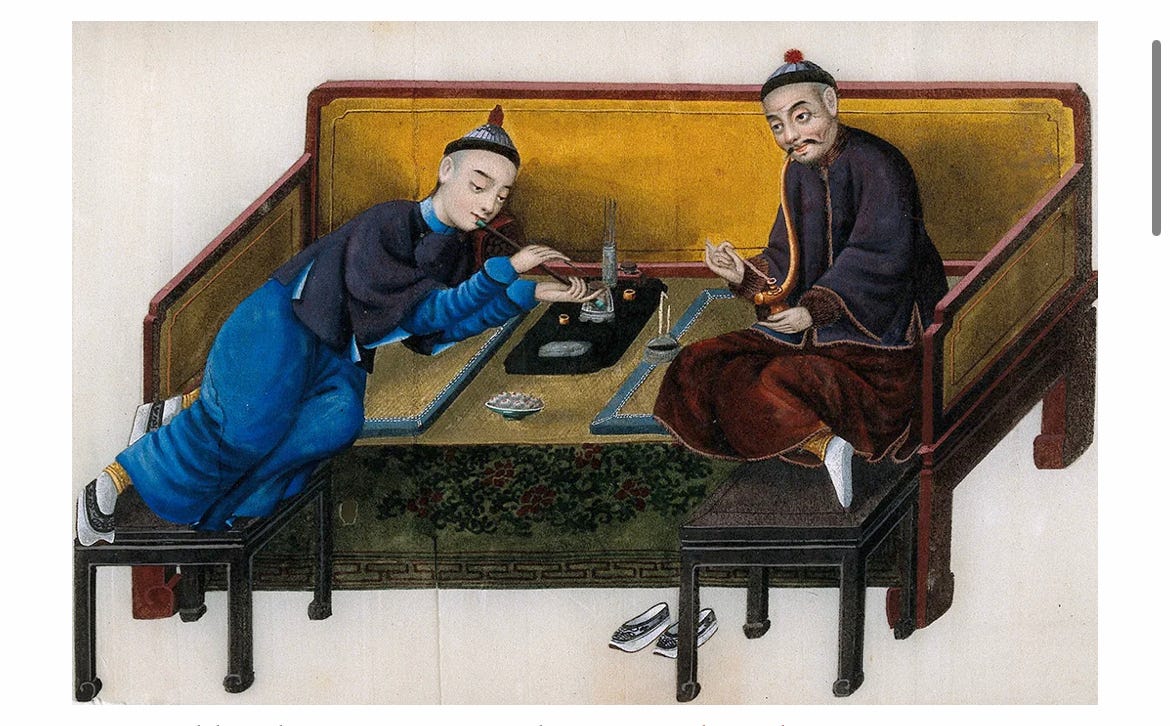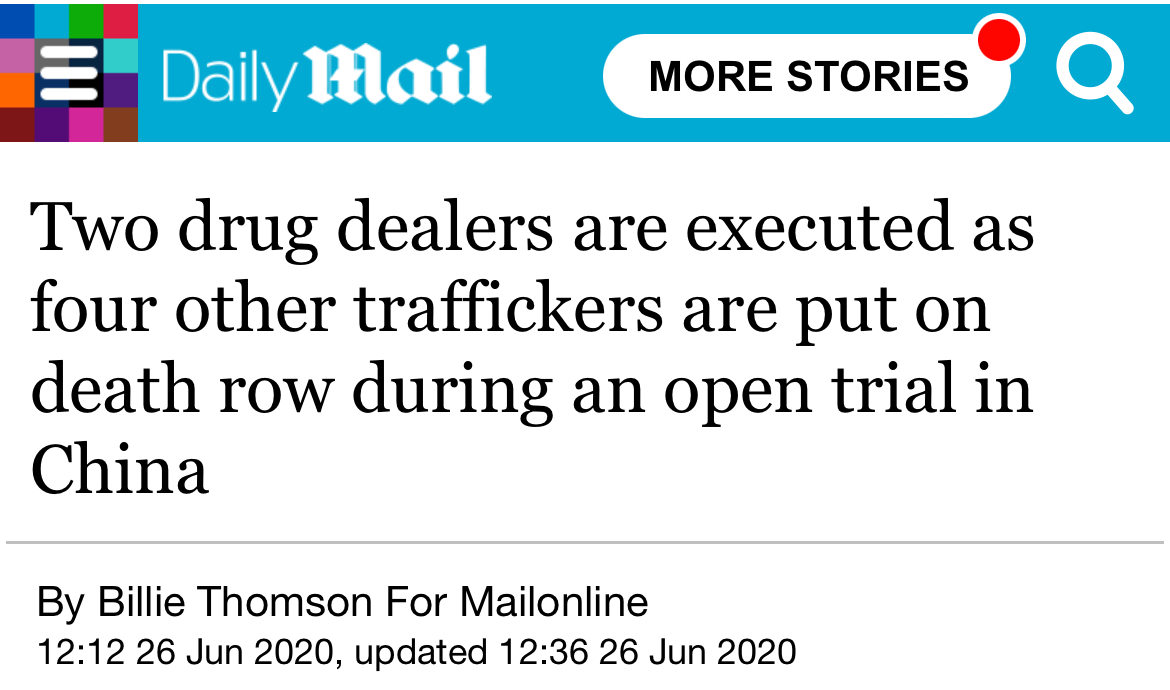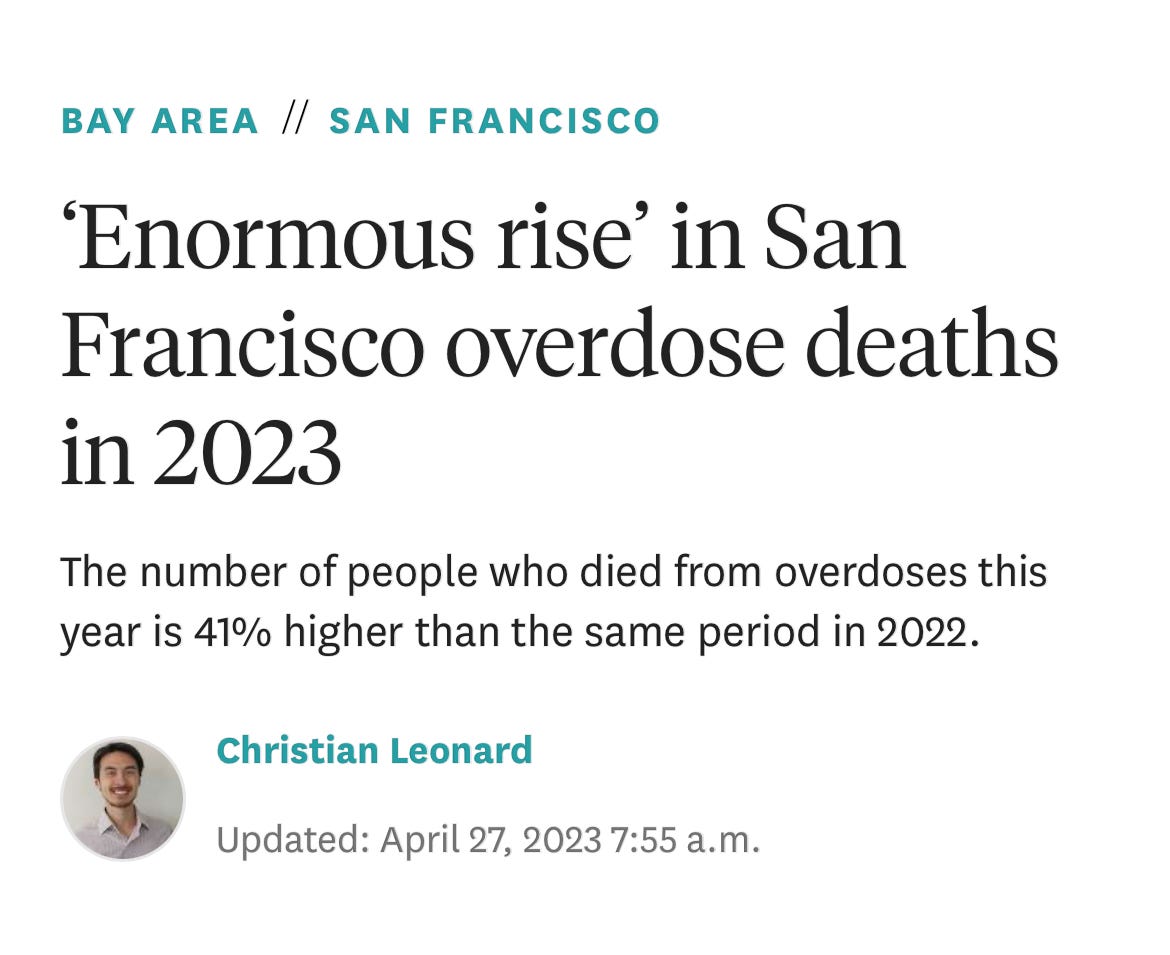On the Opium Wars, then and now
The Chinese experience proves that countries do not have to tolerate drug use; the United States is currently under siege from a disastrous campaign to prove the opposite.
Hola, amigos! I know I haven’t rapped at ya (as the literally legendary Jim Anchower used to write) in a few days - I’ve been busy working on a couple of pieces that are taking a bit longer to come together.
In the meantime, I thought I’d offer two Twitter threads about drugs and drug use I wrote this morning (as I mention in one, I was working on a book about drugs when Covid hit and lockdowns supercharged the American crisis). If nothing else, they’ll give those of you who follow me here and not there a look at the rather different tone I use on Twitter.
—
(READ NOW, PAY LATER)
—
1/ Funny story about opiates. Put it in the weird but true category! China had a big ol' problem with opium in the 19th and early 20th centuriues. Our fault (okay, the Brits too), we shoved opium down their throats. Fought a war to make them import it. I know, not nice...
2/ But hey, the Chinese had all this tea and silver and silk, and it was ours for the taking if we just got them hooked on the shit. Anyhoo, we pretty much ruined China, the whole ruling class was too high to function, dynastic collapse, civil war, famines, whatevs...
(China, then: Smoking the (opium) bowl)
3/ Then Mao and the Communists came along. And it took a while but they kicked Chaing Kai-shek's ass and sent him to Taiwan. And guess what the Communists liked even less than greedy landowners and other capitalist pigs? You got it! Drugs in general and opiates in particular...
4/ And the Chinese Communist Party has changed its mind about a bunch of stuff since 1949, but not drugs. China's version of harm reduction is real simple, they catch you moving the stuff, they reduce the harm by putting a bullet in the back of your head:
(China, now: this is your brain on drugs)
5/ Now, you may say the death penalty for drug trafficking is a little harsh. Maybe so. But guess what country did NOT have 100,000 drug overdose deaths last year? Yep, the same one addicted to opium 100 years ago. Because drug use is not some immutable cultural force...
6/ In the long or even medium term, nations can radically change the amount of drug use by making it more or less culturally and legally acceptable. The left and legalizers know this (which is why they seek to normalize use/addiction), they just like to pretend it's not true...
7/ They want to make you believe levels of drug use are fixed (or inevitably rising) and that all we can do is manage the harm it causes, without admitting A) That we have NEVER found ways to manage the harm B) That the mere fact of pretending we can't deter use encourages it.
8/ And of course you know the kicker on the story: China's hatred of drug use doesn't extend to the fentanyl its factories ship by the kilo to the United States of Overdoses. You might call that karma for the Opium War. Or you might wonder if karma is another word for revenge.
—
The second thread came in response to a question a reader asked in response to the first, the classic libertarian argument to allow drug use:
Should people not have the freedom to use drugs and overdose/kill themselves if they please? Now if we as society should have to pay for their treatment, that's a separate point entirely. My cousin died from the stuff, a safe regulated supply would have saved her life.
My answer:
No. The externalities of use and especially addiction are too severe. The pleasure goes to the user (for a time), the harm to everyone else. This isn't a moral judgment, it's an economic/legal argument. The user is a polluting chemical plant - he profits, the community suffers…
And it's perfectly reasonable for the community to regulate the polluter in the way it sees fit under those circumstances. That doesn't necessarily mean jailing users. What it means at the core is understanding that WE, not they, are the victims of use.
This is the point the legalization/harm reduction movement has succeeded in obscuring. The harm that should be our focus is to the people and community around the user - and we should reduce it as WE think best. The user can always reduce his own harm by stopping use.
(The only thing worse than the War on Drugs is surrendering to them:)
This argument, by the way, is the book I was working on when Covid hit - the philosophical case against legalization/normalization. It's surprisingly necessary. The anti-drug movement argues in pieces: METH ROTS YOUR TEETH! The legalizers have taken the intellectual heights..
Which is why they are so close to winning despite the ever-more obvious harms of rising use. Someone needs to explain (without depending on religious or moral arguments, as those are unpersuasive in the modern West) why societies have the right and responsibility to fight use.
Obviously, this came out of my experience writing Tell Your Children, but it's a different and larger topic - and I was stunned I couldn't find a major (or even minor) book making the case. Maybe I missed it, but I looked.







While I don't disagree with a lot of what you're saying, and sparing the moral argument of the 'right' of the otherwise perfectly societally contributing man or woman to enjoy a J on their front porch (which obviously doesn't hurt anybody), I'm curious what you are actually proposing. We've tried the drug war. I would not personally qualify it as a success, but that's me. Are you saying the status quo, or the 1990's status quo of that drug war would be preferable to what we have currently? I'd love to hear more specifics as to why it would work now but didn't then.
Also, and not to sound like too much of a right-winger, but I think the amount of societal/cultural rot in this country is almost impossible to quantify but also explains a lot of recent negative happenings. For example, guns (including 'assault weapons') have been around for a long time but the idea of people going on mass murdering killing sprees where most of the victims are more or less strangers is a relatively recent phenomenon and I don't see how rationally one can point the finger solely at guns as the cause for this increase. Similarly, I don't think increases in overdoses is solely related to recent legislative moves to relax the drug war. We're living in a more and more broken society and I think these are unfortunately some of the fall out from that.
Alex says he would forcibly outlaw drugs because "The externalities of use and especially addiction are too severe."
Is he aware of the full meaning of individual liberty, which includes not only the freedom to do anything that does not violate the rights of others, but also the responsibility to answer for any harm you have done? So if I get drunk or high and then drive over a pedestrian, I cannot claim I am innocent because I was temporarily incapacitated. When I make the choice to consume the drug, I accept responsibility for any actions that result from that decision. Making individuals responsible for their actions, and unable to rely on the forced charity of others for rehabilitation, would eliminate nearly all
so-called "externalities."